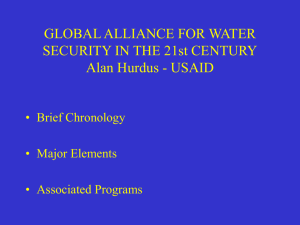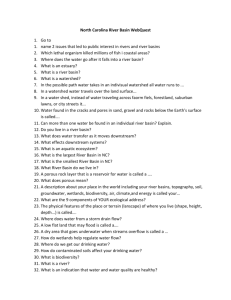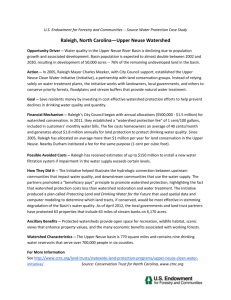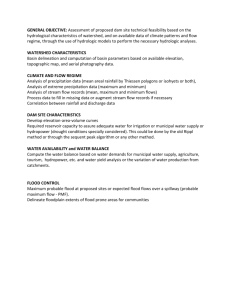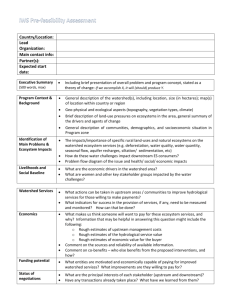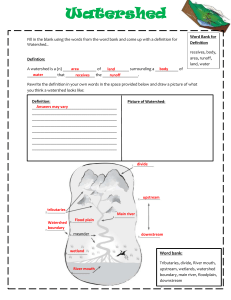KYRGYZ STUDY TOUR EARLY OCTOBER 2011
advertisement
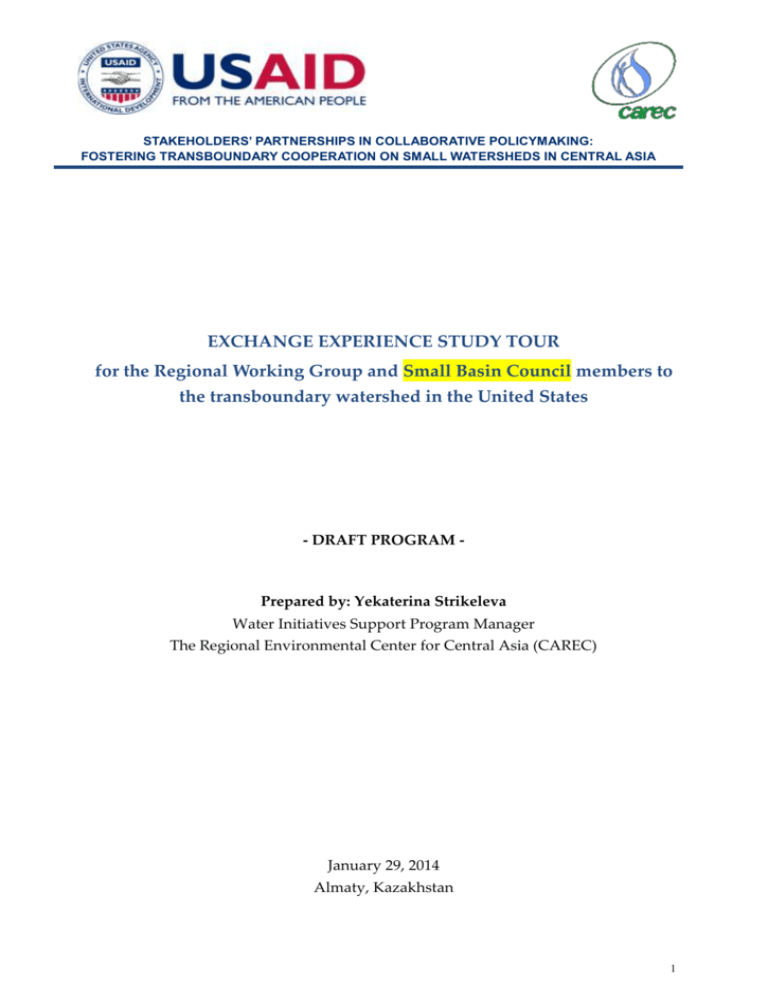
STAKEHOLDERS’ PARTNERSHIPS IN COLLABORATIVE POLICYMAKING: FOSTERING TRANSBOUNDARY COOPERATION ON SMALL WATERSHEDS IN CENTRAL ASIA EXCHANGE EXPERIENCE STUDY TOUR for the Regional Working Group and Small Basin Council members to the transboundary watershed in the United States - DRAFT PROGRAM - Prepared by: Yekaterina Strikeleva Water Initiatives Support Program Manager The Regional Environmental Center for Central Asia (CAREC) January 29, 2014 Almaty, Kazakhstan 1 EXCHANGE EXPERIENCE STUDY TOUR for the Regional Working Group and Small Basin Council members to the transboundary watershed in the United States March 8-14, 2014 Background 1. Transboundary water conflicts in Central Asia arise not over natural supplies but over human interventions to manage them. Dams, irrigation diversions, and other infrastructure alter hydrological relations, affecting the quantity, quality, and timing of river flows, but also relations between upstream and downstream riparians. Today’s water-related problems in Central Asia are not simply rooted in an unequal distribution of water resources, but also have significant historical, political, economic and ecological dimensions. 2. The intensive problems of the shared water resources of Central Asia were internationalised with the breakup of the Soviet Union. Although, there are already institutions in Central Asia that regulate matters of water distribution, their work is hampered by their weak position within the political system and their top down approach. The lack of trust among the states of Central Asia continues to have a severe effect on the functioning of those organisations. 3. New transboundary approaches are needed. The fully integrated management of water resources, which takes into account the interests of different sectors and ecosystems and applies the water basin principle, is gaining ground but is generally not yet the basis for national and transboundary water policies. The continuous lack of dialogue, coordinated action and cooperation between different national authorities with regard to water management both at national and transboundary levels continues to be a significant problem, which also has a negative impact on cooperation with other countries. The ongoing national and international development efforts are mostly focused on large transboundary basins and high level political dialogues among Central Asian states. 4. In April 2012, the Regional Environmental Centre for Central Asia (CAREC) started a project on “Stakeholders’ partnerships in collaborative policymaking: Fostering transboundary cooperation on small watersheds in Central Asia”, with financial support of the United States Agency for International Development (USAID). The objective of the project is to foster transboundary cooperation based on the introduction of integrated water resources management principles in three selected small transboundary rivers (Aspara, Isfara, and Ugam). It will do so through implementation of three interlinked components: (i) capacity development, (ii) piloting good practices, and (iii) regional cooperation. 5. Under the above listed components, small basin councils were established for promotion and development of joint transboundary action plans for sustainable development of watersheds. This will help to enhance cooperation among the national and local authorities, local communities, water users, farmers, NGOs, and other interest groups. The crucial part of the 2 project is a strengthened community involvement in development and management of three selected watersheds and consideration of local needs and priorities. Goal & objectives 6. The overall goal of the exchange study tour is to foster partnership among key water management government and non-government actors from the USA and Central Asian countries by promoting inter-regional dialogue on specific transboundary, basin and integrated water management issues. The specific objectives of the study tour include: 1) to equip participants with the practical knowledge and hands-on skills on implementation of integrated water management and basin principles, 2) to provide with necessary approaches, methods, and tools to improve water allocation between stakeholders sharing a watershed. The study tour program is developed as multidisciplinary, allowing participants to meet with various experts from the U.S. Environmental Protection Agency, Anacostia Interstate Watershed Society, Environmental Law Institute, U.S. Geological Survey, Association of Clean Water Administrators (ACWA), as well as, West Virginia University. Exchange of experiences with representatives of these organizations would provide interesting and innovative opportunities for learning lessons to improve the inter-sectoral and inter- state government coordination and cooperation. 7. The study tour is planned to be held in March 8-14, 2014. It will include: a site visit, face to face meetings, ACWA conference attendance, IWRM committee participation, and one-on-one discussions with USA state administrators responsible for activities of interstate water commissions where IWRM principles are practiced. The delegation will comprise of approximately 13 people. Full list of participants is given in the Table below. The group will be accompanied by the West Virginia University to facilitate learning process and ensure the objectives of the event are met. List of participants # Name Position Kazakhstan 1 Mr. Serikaliy Mukatayev The head of the Balkhash-Alakol basin inspection (appointed by the Ministry of Environmental Protection and Water Resources) 2 Mr. Rauf Sabitov Director, NGO “Zhabagly Manas Mountain Club”, member of Small Basin Council on Kazakh part of Aspara Watershed 3 Mrs. Kalampyr Kozhamzharova NGO “UGAM”, member of Small Basin council on Kazakh part of Ugam watershed Kyrgyzstan 4 Mr. Zhanybek Orozumbekov The head of Panfilov district water management organization, member of Small Basin Council on Kyrgyz part of Aspara watershed 5 Mr. Kanat First deputy of Akim of Panfilov district, chairman of Kyrgyz part of 6 Davletov Aspara watershed Small Basin Council Mr. Doranbek Mamadiev Technical inspector of hydro technical infrastructures, deputy chairman of Kyrgyz part of Isfara watershed Tajikistan 7 Mr. Rustam Shomirsaidov Head of State Department of water resources of Isfara city, chairman of Tajik part of Isfara watershed Small Basin Council 8 Mr. Husniddin Sharofiddinov Chief specialist of Department of monitoring of pump station and water facilities, member of Tajik part of Isfara watershed Small Basin Council Uzbekistan 9 Mr. Zokir Rakhimov 10 Mrs. Zulfiya Yarullina Senior specialist, Department of International Relations and Programs, State Committee for Nature Protection Chief specialist, Main Department for protection and efficient use of water resources, conservation of land resources, common minerals and waste management, State Committee for Nature Protection CAREC 11 Mrs. Anna Inozemtseva Water Initiative Support Program Specialist 12 Ms. Tais Reznikova Water Initiatives Sup[port Program Assistant Rationale 8. The United States of America was selected as a destination of the study tour given the country's long history on river basin management and experience in integrated water resources management. The interstate, political and academic environment in the USA is advanced, and delegation from Central Asia would have access to a wide range of experts from the U.S. Environmental Protection Agency, Anacostia Interstate Watershed Society, Environmental Law Institute, U.S. Geological Survey, Association of Clean Water Administrators (ACWA), as well as, West Virginia University. Expected Results 1. Improved understanding on water sector development of the USA and Central Asian countries; 2. Learn best practices and information on implementation of IWRM and basin principles in interstate rivers in the USA; 3. Establish a network between US and Central Asian colleagues for new partnership opportunities; 4. Learn about advanced technologies, methods, tools on water resources distribution in Anacostia watershed; 5. Assess the applicability of different available methods and approaches, and make the relevant revisions/improvements/recommendations for the national and regional counterparts. 6. The results of the project will be widely shared through existing platforms. 1. Scope of Work for West Virginia University – subcontractor of USAID-CAREC Project Organization of the study tour in cooperation with WVU; Programme preparation, proposing and selection of relevant organization: experts to be consulted, visits to selected institutions, social event (e.g. dinner, sightseeing or similar) and other activities (informal meetings, roundtables, discussions etc.). Review/ revise programme preparation for the study tour. Selection of organizations to participate in the international study tour to the USA; Logistical preparation; Identification of the Study Tour priority areas; Regular communication with CAREC; Provide interpreter during the study tour; Handing over the needed information if any. Report on the study tour results, lessons learnt and possibilities of further follow-up activities. Draft Program CAREC DC STUDY TOUR ITINERARY *: March 8th (Sat)-14th(Fri), 2014 DAY 1 (SATURDAY)- March 8th: (Arrival, Registration, Rest, Dinner) Arrival at Airport, pick up and travel to Washington Marriott, 1221 22 nd St NW. Either by van or SUPER SHUTTLE. Presume AP is Dulles or BWI: Day 2 (SUNDAY) - March 9th in DC. (Cultural /Educational, Rest) 8-9am Breakfast, 10 AM - 3 PM, Private DC Tour (Lunch) 3-6PM- Walking at Smithsonian and Washington Mall 7 pm- Dinner, LOCATION TBD at Mall Area. 9 PM, Return to Marriott Day 3 (MONDAY) - March 10th in DC. (Regulatory/Educational, Technical, Social Network)) 8-9 AM Breakfast 10 AM- Noon: Meeting with EPA/USDA (Transportation) Noon-2pm (Lunch at Reagan Building) 2-4PM, Association meeting TBD (Transportation) 6 PM, Dinner, LOCATION TBD or ACWA Reception at Marriott 9 PM, Return to Marriott Day 4 (TUESDAY) - March 11th in DC. (Legislative/Policy, IWRM Conference) 8-9 AM, Breakfast 10 AM- Noon, Meeting at Environmental Law Institute (Transportation) Noon- 1PM, LUNCH 1:30 – 6PM, ACWA Conference Sessions/IWRM Panel Discussion 7 PM, Dinner, LOCATION TBD 9 PM, Return to Marriott Day 5 (WEDNESDAY) - March 12th in DC. (Interstate Watershed Field Trip) 8-9 AM, Breakfast 10 AM- 5PM Anacostia Watershed River Tour, Lunch (Transportation) 6 PM , Dinner, LOCATION TBD in Watershed 9PM, Return to Marriott. Day 6 (THURSDAY) - March 13th in DC. (Educational, Technical, Culture) 8-9 AM, Breakfast 10 AM- Noon, USGS Meeting in Reston Virginia, data utilization Noon-1PM Lunch in Reston 2PM – 6 PM, Free Time, Shopping, Exploring. LOCATION TBD 7 PM, Last Night in DC Group Dinner, LOCATION TBD 9PM, Return to Marriott. 6 Day 7 (FRIDAY) - March 14th in DC.( Travel Day) 8-9 AM, Breakfast 10 AM Depart for Washington/Dulles or BWI Airport
